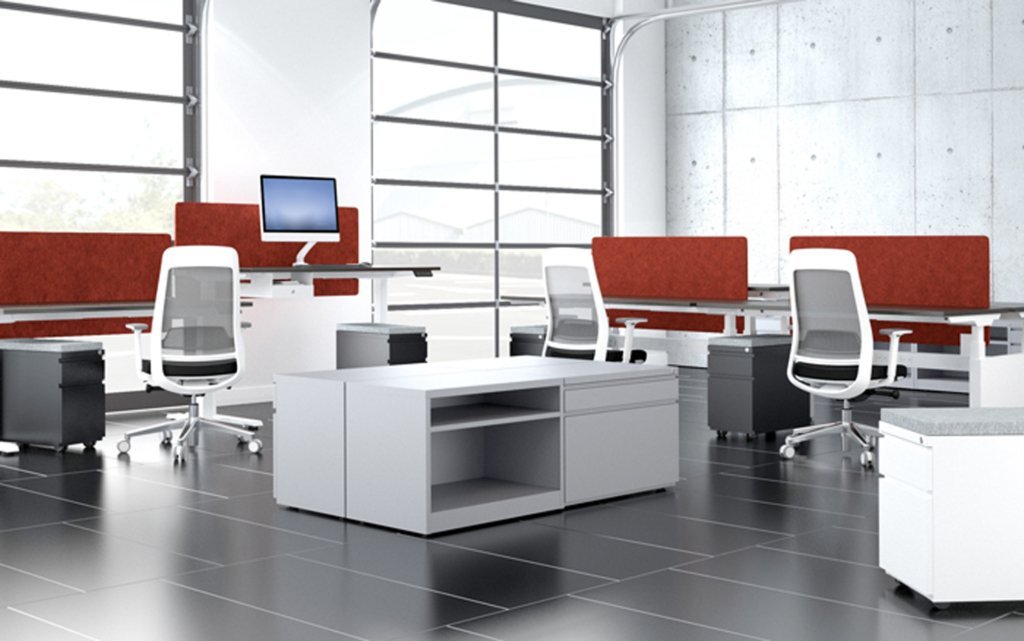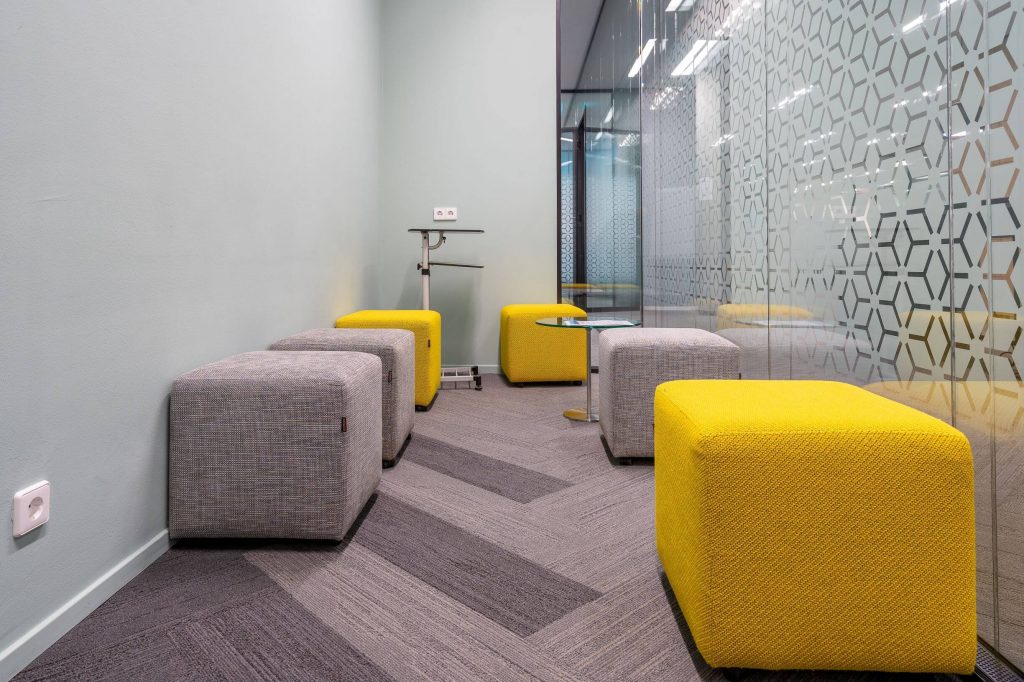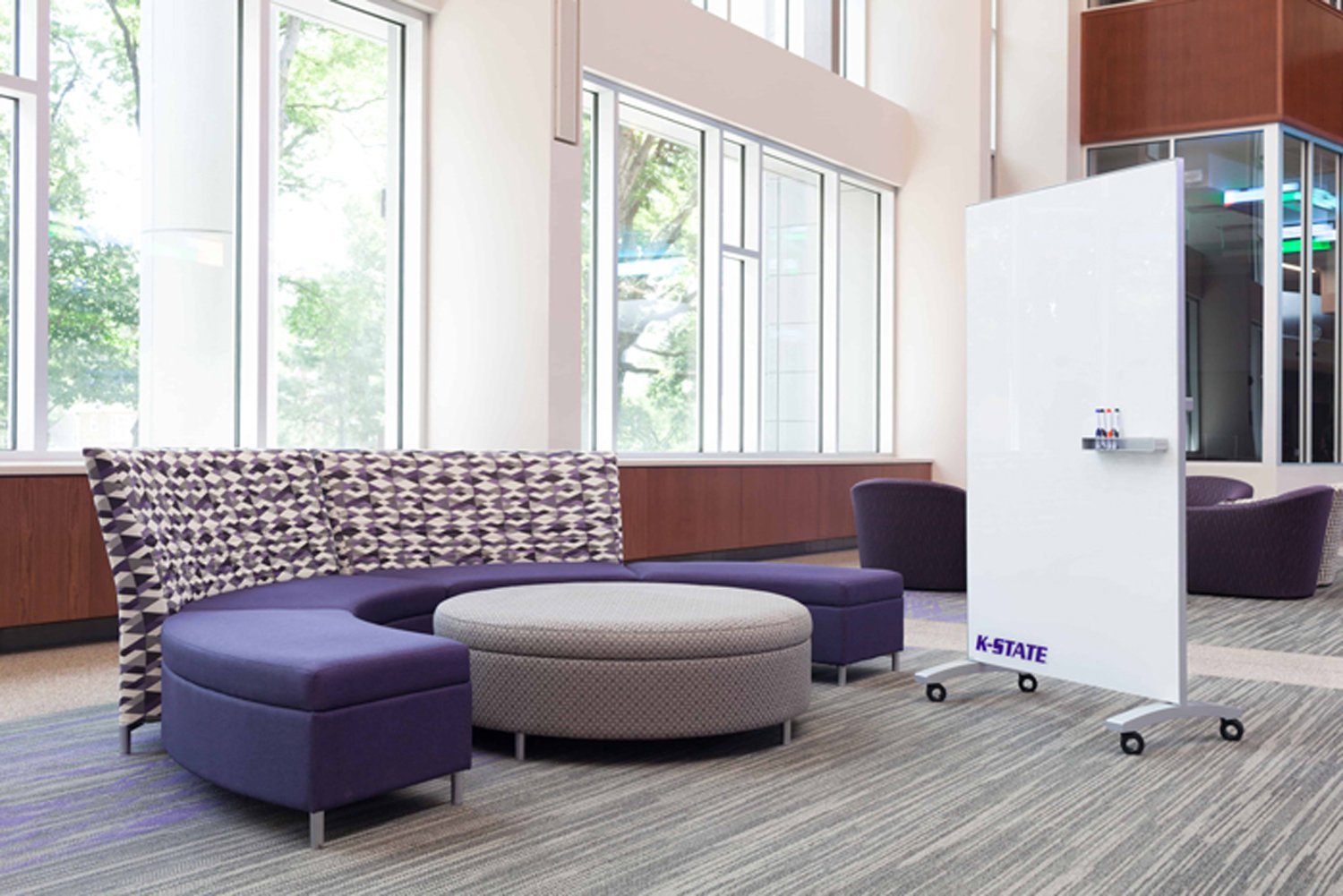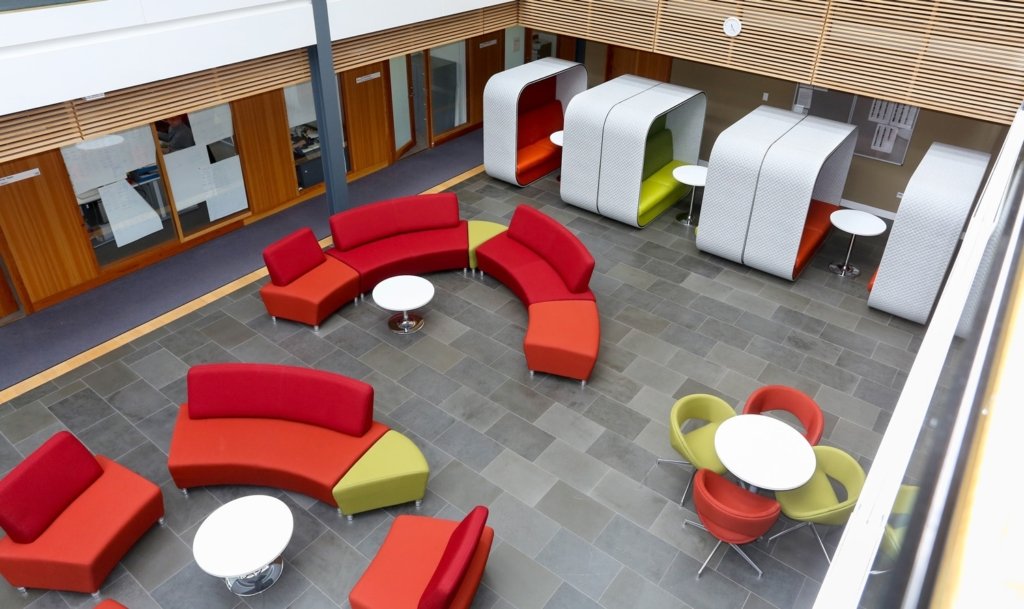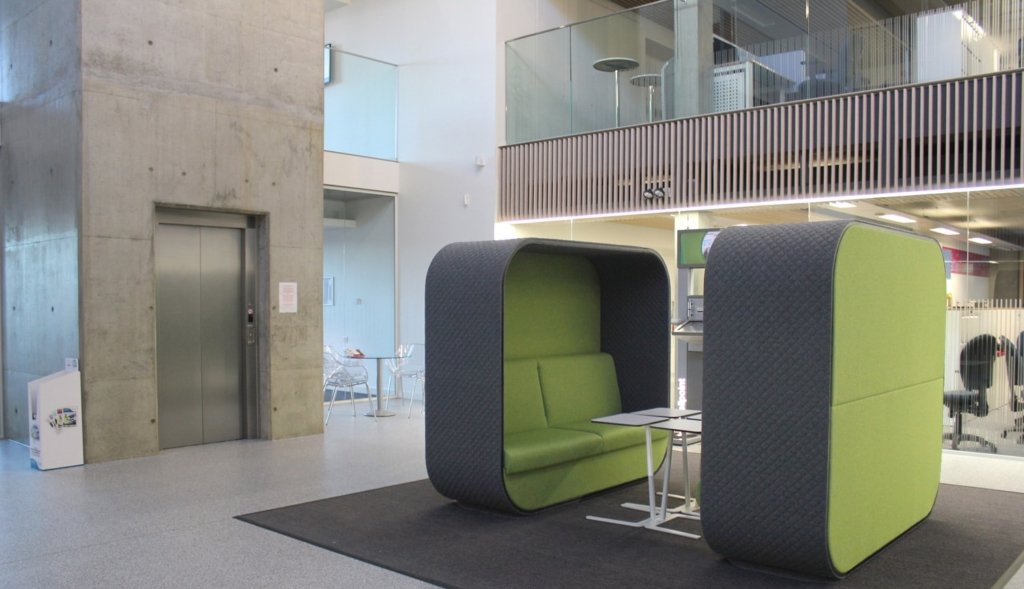Why The Millennial Workforce Matters In 2026
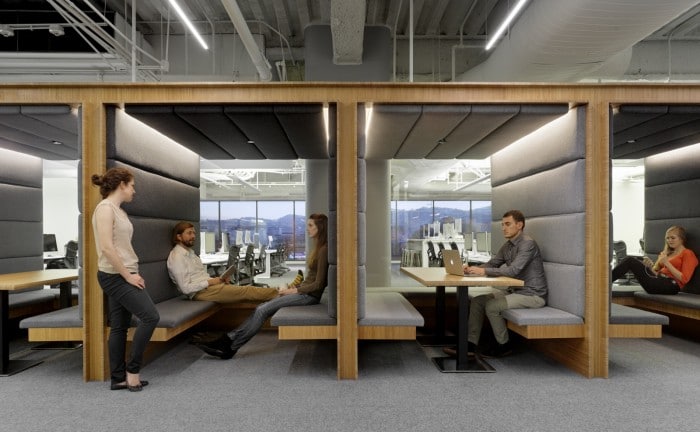
When we look at the future of work in 2026, one clear thing is that more than half of the global workforce will be millennials.
The generation that was born between 1981 and 1996.
Now we want to know: Why the millennial workforce matters in 2026?
The millennial workforce matters in 2026 because they make up the largest share of employees, driving demand for flexible workspaces, technology integration, sustainability, and work-life balance, shaping how companies design offices and culture.
In Deloitte’s 2025 Gen Z & Millennial Survey, 92 % of millennials said that feeling their work has meaning is “very important” to their job satisfaction, ahead of pay, perks, or titles.
When that purpose doesn’t materialize, they vote with their feet: Gallup still pegs annual millennial turnover at roughly $30 billion in lost productivity and rehiring costs.
These people are highly motivated and risk-taking, and are taking on management and decision-making positions in companies.
Their characteristics, such as valuing the meaning and purpose of work, their desire for flexibility and continuous learning, have changed the way we work, organizational culture, and even the future of the economy.
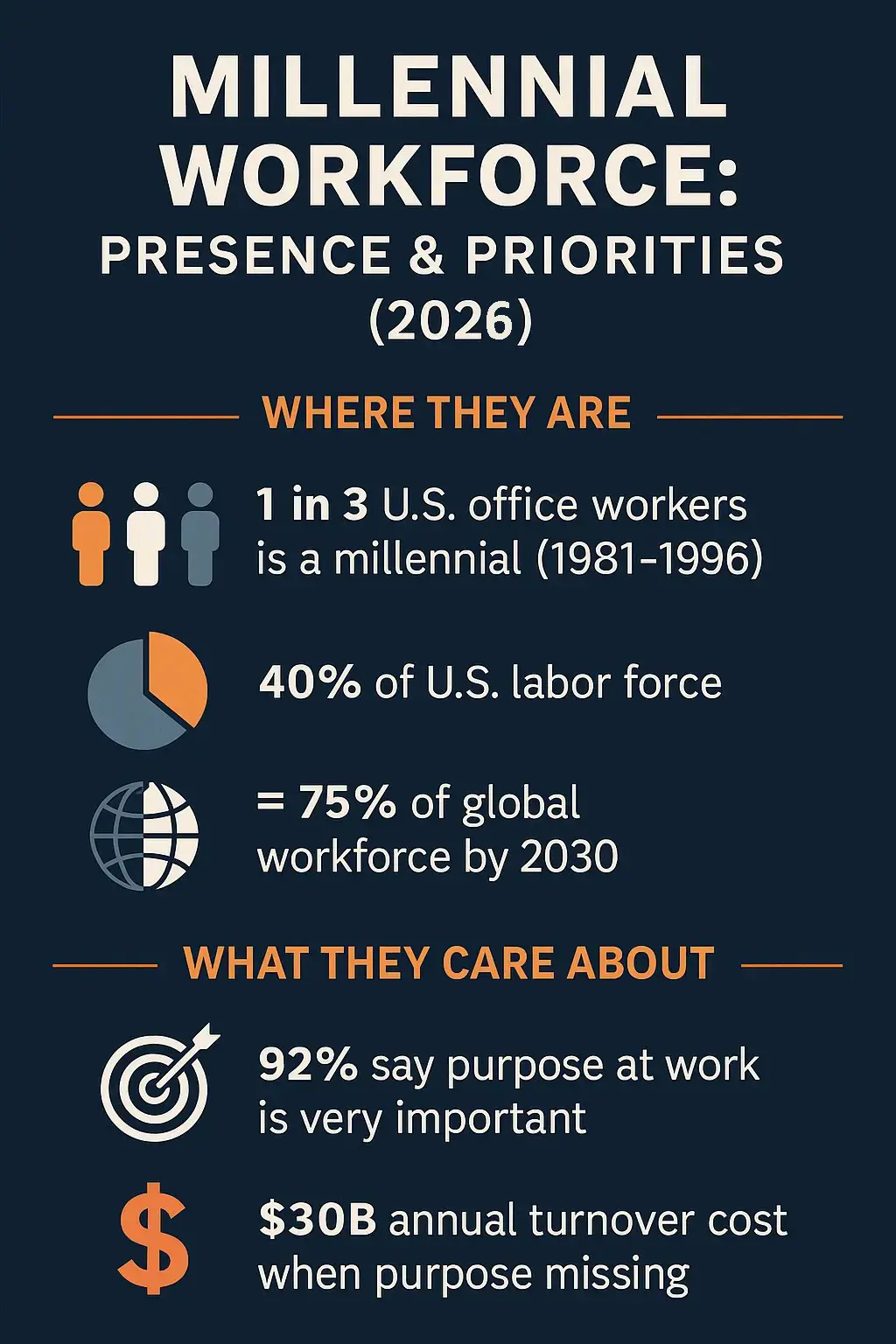
Millennials’ Proportion and Influence in the Workforce
Millennials already account for about 40 % of the American labour force and, if global forecasts hold, they will make up roughly three-quarters of all employees worldwide by 2030.
In some countries, this share is even higher, as this generation comprises a large portion of the active and educated population.
When this percentage of the workforce belongs to a particular generation, their values, priorities, and expectations will naturally determine the future direction of work.
Until a few years ago, the Millennial generation was mostly known for executive or expert roles, but in 2026, this will no longer be the case.
A significant portion of this generation has now moved into management and leadership roles.
Therefore, the values and views of the millennial generation are no longer just employee demands, but also management policies and even corporate decision-making strategies.
The Millennial generation has also greatly influenced workplace culture.
They value issues such as flexibility in working hours and location, continuous learning, and growth more than previous generations.
This has led many companies to redefine their organizational culture to attract and retain these employees.
The White Collar Talent Shortage
As the baby boomer generation exits the workforce, businesses are facing a shortage of skilled and educated workers in areas such as management, technology, finance, law, marketing, and other knowledge-intensive occupations.
Unlike manual jobs, these jobs require complex skills, a college education, and analytical abilities.
Desperate employers are giving power to millennials in the workforce because they need top talent, and the newest generation has it.
They’re proud of it, too, and that’s not a bad thing. The passion millennials bring to their work gets things done and resonates with the newest generation of buyers.
A large portion of managers and professionals from previous generations are leaving the job market, while there are still not enough replacements from younger generations.
On the other hand, many young talents tend to work in organizations that have a flexible, meaning-driven, and value-driven culture.
Companies that fail to meet these expectations will face problems attracting and retaining white-collar workers.
The Baby Boomer generation is returning to the workforce, looking for entry-level jobs that millennials want. This causes a problem for employers because instead of changing to attract younger workers, they’re finding it easier to hire retirees.
Engagement data reinforce the point. As of mid-2024, only 32 % of U.S. workers describe themselves as “fully engaged”, and millennials are the least patient group when that connection slips.
Recruiting isn’t any easier: a 2026 benchmarks study found hiring teams now conduct 42 % more interviews per tech hire than in 2021, pushing average time-to-fill to 41 days—about a quarter longer than cross-industry roles.
You Might Also Enjoy: Create a Millennial-Friendly Workplace In Your Office
What Millennials Want
The Millennial generation has a different outlook on work and life compared to previous generations.
Research from Deloitte and other institutions shows that this generation’s priorities have changed dramatically.
These changes affect both the individual work experience and shape organizational culture and even business strategies.
1. Learning and Development
Unlike previous generations who were more interested in job titles and moving up the organizational hierarchy, millennials value continuous learning, skill development, and opportunities for personal growth.
They are looking for workspaces that provide them with opportunities for learning and new experiences.
In fact, this generation sees real growth in improving skills and abilities, not changing job titles.
2. Financial Security, Well-Being, and Meaning at Work
Millennials are concerned about the economy, the cost of living, and their financial future.
But beyond financial considerations, they want to do something that is meaningful and aligned with their personal values.
For this reason, organizations that pursue a social mission or sustainability goals have a better chance of attracting this generation.
3. Work-Life Balance, Flexible Arrangements
This generation cares more about work-life balance than any other generation.
They consider long hours of office desk work a sign of weakness in the organization’s time management.
Millennials are the butt of many jokes about laziness, but the fact is, they work 50-70 hours per week.
They believe strongly in work/life alignment and want their jobs to align with what they believe.
For many of them, remote and hybrid working models are not a privilege, but a natural right.
Companies that don’t offer such flexibility will easily lose millennials.
4. Connectivity Matters
Digital-native habits mean millennials are 42 % more likely to rely on real-time messaging and collaboration apps at work. Any environment that blocks Wi-Fi, mobile connectivity, or spontaneous teamwork is a deal-breaker.
Furniture and Layout Millennials Actually Want in 2026
Modern office furniture and workplace design are important to millennials.
In 2026, what they expect from furniture and layouts will be completely different from previous generations:
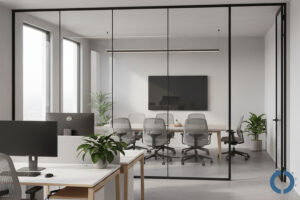 1. Flexible Spaces and Office Furniture
1. Flexible Spaces and Office Furniture
Millennials are interested in workspaces that are changeable and adaptable to different needs.
For example, modular tables that can be used individually or in groups, adjustable countertops, demountable walls, and movable partitions.
Also, designing rooms that can be used for both formal meetings and free group work is practical and attractive for this generation.
This flexibility helps teams assemble or disband as needed, without heavy moving or construction.
2. Comfortable and Ergonomic Furniture
One of the values that is a priority in workplaces for this generation is health and well-being.
Ergonomic office chairs, height-adjustable desks and tables, such as sit-stand desks, and comfortable furniture for short breaks are among their main demands.
Comfort increases productivity and reduces fatigue and physical injuries caused by prolonged sitting.
You Might Also Enjoy: Demountable Walls Vs Drywall: Ultimate Guide [2026]
3. Collaboration Spaces
Millennials value interaction and teamwork, so a layout that allows for teamwork and rapid interaction is important to them.
This office furniture includes collaborative workstations with laptop connectivity and charging, comfortable office chairs Houston with wheels, and modular benching systems where teams can gather easily.
Along with collaborative spaces, using acoustic panels or soundproof partitions to reduce ambient noise allows teams to talk easily in open environments without disturbing others.
4. Quiet and Private Spaces
While interested in collaboration, millennials need quiet corners for individual focus.
For example, phone booths or acoustic pods, private office cubicles, standing desks with sound dividers, and comfortable, ergonomic chairs in quiet corners can be mentioned.
5. Inspirational, Biophilic, and Green Design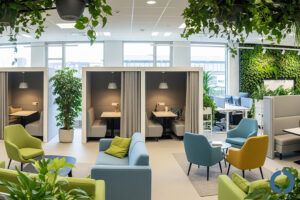
It is important for millennials to have natural plants, ample lighting, modern furniture in soothing colors, and even wall art in their workspace.
Light wooden tables, colorful chairs with modern designs, natural plants on tables or in common spaces, paintings, and artistic elements are among these items.
Such a design increases motivation, reduces stress, and creates a sense of belonging to the environment.
6. Amenities
Creating relaxation spaces, game rooms, or exercise rooms are all part of the desired layout for millennials in 2026.
Comfortable couches and chairs in lounge areas, game tables, small coffee tables, and charging and beverage stations are among the office furniture that you can use in these spaces.
Amenities increase job satisfaction, informal interaction, and effective employee rest.
You Might Also Enjoy: What Is Biophilic Furniture: 2026 Guide
A Six-Month Field Test in Houston
Last year, a 120-person SaaS company in Houston replaced fixed cubes with 48 electric sit-stand desks, four acoustic pods, and a café-style social zone. Six months later:
- Voluntary turnover fell 15 %
- Employee net-promoter score rose 26 points
- Revenue per sales rep climbed 11 %
The CFO’s verdict: “Furniture costs less than a single regrettable resignation.”
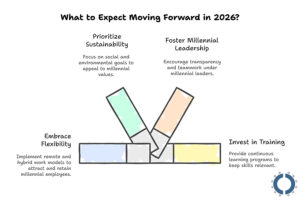 What to Expect Moving Forward in 2026
What to Expect Moving Forward in 2026
By looking at current trends and the behavior and needs of the millennial generation, we can predict how the work environment of organizations will change in the coming years.
- Trends likely to grow stronger: The Millennial generation, with its priorities, is shaping the path of many work changes.
Flexibility in when and where you work will continue, and remote and hybrid working models will become more popular than ever.
Companies that pursue social and sustainability goals will be more attractive to millennial employees.
- Millennial leadership: As millennials enter management and leadership roles, organizational culture will move toward transparency, flexibility, and teamwork.
Decisions are made faster, and innovation and creativity increase in organizations.
Millennial leaders encourage employees to contribute and come up with new ideas by creating inspiring environments.
- Policy changes, training, and skills development: To adapt to these trends, work policies need to be more flexible and supportive of employee health and well-being.
Continuous learning and skill development programs for this generation must be designed in line with rapid technological changes.
Organizations must also build their culture and structure in a way that can attract, engage, and retain millennials; otherwise, they may face workforce shortage challenges.
Conclusion
As we have examined, the Millennial generation will be more important in the workforce in 2026 than ever before.
They both make up a large portion of the workforce and, with their values, priorities, and skills, shape the direction of organizations, business models, and even economic culture.
Employers and organizations need to understand the millennial generation and create a work environment that aligns with their needs and values.
One of the most important pieces of advice that can be given to millennials is to develop their technical and soft skills, follow their values at work, and take advantage of continuous learning opportunities to succeed in fast-paced and changing work environments.
As a result, it is clear why the millennial workforce matters in 2026.
They are the driving force behind innovation, transformation, and sustainability in organizations and society.
Frequently Asked Questions (FAQ)
- What percentage of the workforce will be Millennials by 2026?
By 2026, Millennials will make up approximately 75% of the global workforce.
This demographic shift means they will have a major impact on organizational culture, work processes, and business priorities.
- What is the workforce trend in 2026?
The workforce trend in 2026 is moving towards flexibility, technology-centricity, and a focus on employee well-being.
Remote and hybrid work models will become more common, artificial intelligence and automation will play a greater role in jobs, and organizations will focus on continuous learning, skills development, and open organizational cultures to attract and retain younger generations.
- What types of jobs do Millennials prefer?
Millennials are interested in careers in information technology, data analytics, project management, and consulting. They are looking for opportunities to grow professionally and develop new skills.
- What are the factors that drive job turnover among Millennials?
Factors such as economic pressures, dissatisfaction with the workplace, lack of professional growth opportunities, and lack of work-life balance can all drive job turnover among Millennials. They are looking for work environments that support their well-being and personal development.
- What challenges do millennials face in the workplace?
Millennials face challenges such as economic pressures, job insecurity, a lack of career growth opportunities, and a lack of work-life balance.
These challenges can negatively impact their job satisfaction and motivation.

John Ofield is the owner of Collaborative Office Interiors. Houston’s trusted source for modern and commercial office furniture, office cubicles, demountable walls, office desks and tables, and complete workspace solutions. With more than 40 years of experience, he combines deep product knowledge with hands-on space-planning expertise to create ergonomic, productivity-focused work environments for businesses across Southeast Texas.


